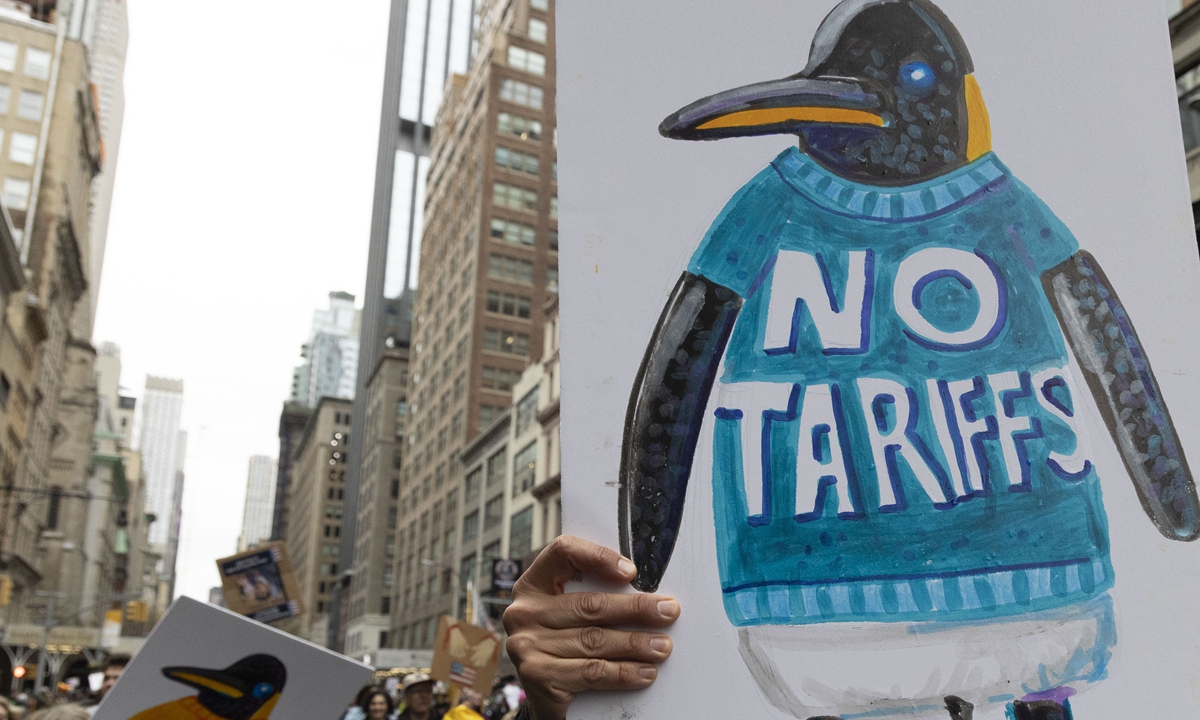
Protesters hold signs with images of penguins wearing sweaters that read "NO TARIFFS" during "Hands Off" protests in midtown Manhattan, New York City, on April 5, 2025. Photo: IC
The implementation of US tariffs has further sparked domestic opposition as the negative impacts become more apparent, with scholars and economists voicing to "reject harmful tariff policies" along with multiple sectors bearing with growing pressure. A Chinese expert on Sunday said that the intensified tariff-induced negative impacts could further cast instability in the supply chain, triggering broader economic uncertainties.
As of press time, 980 individuals have signed the Anti-Tariff declaration, according to the number of signatures seen on the website. The declaration was jointly initiated by economists and scholars in related fields, including two Nobel laureates - Vernon Smith and James Heckman.
"The current administration's tariffs are motivated by a mistaken understanding of the economic conditions faced by ordinary Americans. We anticipate that American workers will incur the brunt of these misguided policies in the form of increased prices and the risk of a self-inflicted recession," read the statement.
The declaration also said that "the 'reciprocal' tariff rates being threatened and imposed by the US upon other countries are calculated using an erroneous and improvised formula with no basis in economic reality," warning that the "window to reverse these incoherent and damaging policies is closing."
Meanwhile, thousands of protesters rallied in Washington and other cities across the US on Saturday to voice their opposition to the US government's policies on deportations, government firings, and the wars in Gaza and Ukraine, Reuters reported.
Industrially, US domestic auto companies have been facing challenges of higher prices. For instance, the three most popular models of General Motors' Buick are made outside the US, meaning that all three are now subject to stiff tariffs that could add thousands to sticker prices on dealer lots in the US, according to a separate Reuters report.
Meanwhile, Ford has cautioned its dealers that tariffs will likely raise prices in the coming months, CNN reported. In a memo to Ford dealers first reported by Automotive News, the automaker told dealers that the cost of those tariffs could be passed down on some vehicle deliveries starting in June since "certain tariffs are likely to remain in place for at least some time," per the CNN report.
Barclays analysis has reduced its 2025 General Motors' earnings before interest and taxes estimates by 40 percent based on lower volume and the gross tariff impact of about $9.5 billion. For Ford Motor, Barclays expects a 60 percent reduction with a gross tariff impact of about $7 billion, per the Reuters report.
As the negative effects of tariffs continue to emerge, leading industrial players are struggling to maintain their original supply capacities, with critical components and intermediate goods becoming unavailable at previous prices, potentially forcing firms to raise prices, Zhou Mi, a senior research fellow at the Chinese Academy of International Trade and Economic Cooperation, told the Global Times on Sunday.
The existing supply chains may fail to meet demand, exacerbating instability in supply networks as the tariff-induced negative impacts intensify. The instability could cast uncertainty over whether production can be sustained, which could lead to companies' shrinking market share and affect employment and trigger broader economic uncertainties in the US, including disruptions across supply chain networks, according to Zhou.
As for logistics, DHL said that effective Monday, and until further notice, it will temporarily suspend the collection and shipping of business-to-consumer shipments to private individuals in the US where the declared customs value exceeds $800, the company said in a statement on its website.
As a result of recent US customs regulatory updates, the company is experiencing multi-day transit delays to the US from any origin for shipments with a declared customs value exceeding $800, DHL said.
In terms of tourism, the number of overseas visitors to the US last month fell nearly 12 percent compared with the same time last year, the Washington Post reported, citing data from the International Trade Administration, an agency under the US Department of Commerce. The downturn, after a 2 percent decline year-on-year in February, is the first meaningful drop since travel plummeted in the early days of the COVID-19 pandemic, per the report.
The data showed that there were 17 percent fewer visitors from Western Europe in March, 24 percent fewer from Central America and 26 percent fewer from the Caribbean compared with a year ago.
Zhou said that the market order could suffer severe damage beyond just price inflation under supply shortages, which would plunge US economy into deeper crises, prompting investors to reallocate capital to more stable, secure, and predictable markets.
Global Times
阅读原文:https://www.globaltimes.cn/page/202504/1332466.shtml